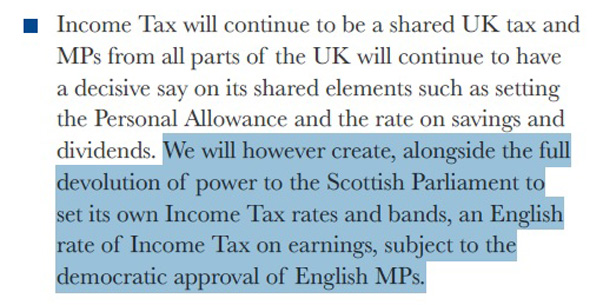The Conservatives have published an English manifesto for the first time.
The big headline promises are “English votes for English laws” and “an English rate of income tax”.
Both the SNP and Labour say this is a breach of the Smith Commission agreements on more powers for Scotland signed off by all the major parties a couple of months after the independence referendum last year.
The Conservatives deny they are breaking their promises to Scotland, just delivering a fairer deal for England. Who’s right?
What’s the plan?
The Conservatives want to insert a new stage in the process by which parliament makes laws.
If new legislation only affects England, a “grand committee” of English MPs will effectively get a veto over it.
This will prevent Scottish MPs voting on all kinds of laws that affect England, and it will specifically stop Scottish MPs being able to help decide the rate of income tax south of the border.
The current plan is for income tax rates and bands to be devolved to the Scottish parliament, so English MPs won’t get to vote on them.
But Scottish MPs would still get to vote on what the rates and bands are south of the border. The Tories say that is unfair.
It looks like this would all be pretty complicated in practice, judging by the detail set out in the Conservatives’ manifesto. But the Tories say they could have it in place by budget 2016.
Is it a broken promise?
The Conservatives, Labour, the Lib Dems, the SNP and the Greens are all committed to implementing the reforms agreed in the Smith Commission report, which gives Scotland a range of new powers.
Arguably most important is the commitment to give Scotland the power to set its own income tax rates and bands.
But the Smith Commission agreement also state: “Income tax will remain a shared tax and both the UK and Scottish Parliaments will share control of income tax. MPs representing constituencies across the whole of the UK will continue to decide the UK’s budget, including income tax.”
Labour and the SNP say the Tory plans are an obvious breach of this principle.
The Tories say this isn’t true, because Scottish MPs would actually continue to vote on the budget like they do now.
It’s just that non-Scottish MPs would get a new veto to stop the Scots having too much influence on tax rates and bands outside Scotland.
A spokesman explained this to us by saying: “If we don’t make the changes we’re proposing for English votes for English laws, the votes of Scottish MPs could combine with a minority group from the rest of the UK to move bands that only affected England in a certain direction against the wishes of the majority of MPs from the rest of the UK.”
The Conservatives also say that it’s a “red herring” for opponents to bring up the Smith Commission, when the commission only looked at Scottish devolution as part of its terms of reference, not the future devolution of more powers to England.
An “English rate of income tax”?
Not exactly. Hidden in the small print of the Tories’ plans is the fact that the “English” rate of income tax will still actually apply to Wales and Northern Ireland too and their MPs will vote on it.
This is not made clear in the manifesto, though a note at the bottom of the press release confirms: “Income tax is not devolved to Wales and Northern Ireland so MPs from those nations will continue to be involved in voting on the rate.”
So while the manifesto talks about creating “an English rate of income tax on earnings, subject to the democratic approval of English MPs”, it would be more accurate to call it “a non-Scottish rate of income tax on earnings, subject to the democratic approval of English, Welsh and Northern Irish MPs”.





